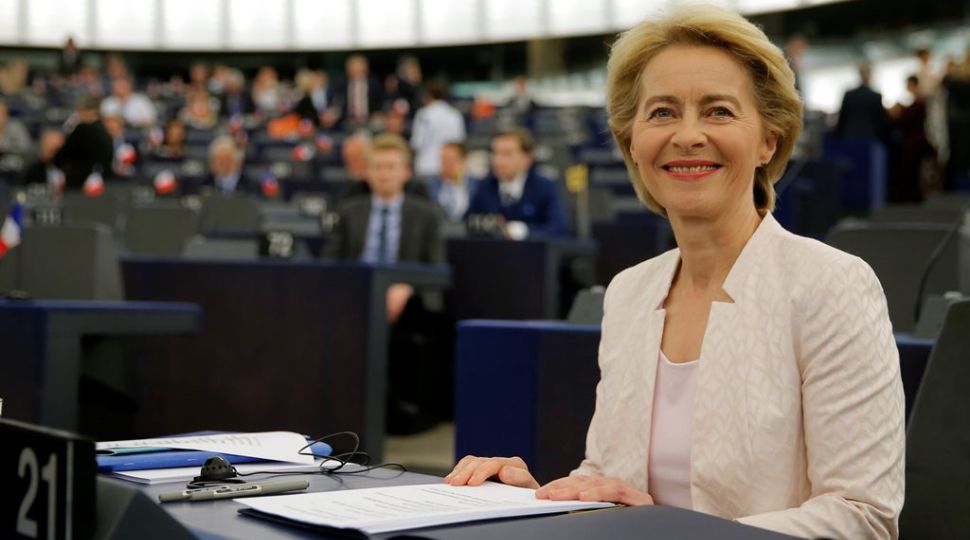What von der Leyen's Election as Commission President Means for Europe

The Circumstances of the New President’s Appointment. After the European elections, none of the faction-selected candidates (Spitzenkandidaten) for the post of EC president was able to garner sufficient support within the European Council. French President Emmanuel Macron put forward German defence minister Ursula von der Leyen, who had been marked as a possible future commissioner. European heads of state and government eventually backed von der Leyen’s nomination. Only German Chancellor Angela Merkel abstained, because of the requirements of the coalition agreement in Germany.
The European Council’s decision received a critical reaction from a large number of MEPs, who demanded that a Spitzenkandidat be appointed EC president. The Social Democrats and Greens were particularly critical in their assessment of von der Leyen’s acumen and achievements. Following negotiations, the candidate was backed not only by her own Christian Democratic group but also by a majority of Liberals and Social Democrats. Support for her (383 votes) was, however, only slightly higher the required absolute majority (374). Judging by MEPs’ declarations, von der Leyen has not managed to build a majority consisting solely of representatives of the three largest political groups. The support of the Polish Law and Justice party (26 members) and the Italian Five Star Movement (14) was decisive for her success.
The German Context of von der Leyen’s Election. The European Council’s decision aroused controversy in Germany, for von der Leyen is among Merkel’s closest circle. She is the only politician to have served as minister in all of Merkel’s governments since 2005. A long career in the German government allowed her to create a wide network of contacts in Europe and the world, but her political position in Germany has weakened in recent years. Although von der Leyen belongs to the group of CDU vice-presidents and was mentioned as the Merkel’s successor, her achievements as defence minister are often criticised. Although the Bundeswehr budget increased by EUR 11 billion during her time as defence minister, the current state of the German armed forces, which are still struggling with equipment shortages and insufficient investments, is a burden for von der Leyen. Allegations of irregularities in issuing orders for external consulting companies, currently being investigated by the parliamentary investigation committee, are another problem for von der Leyen.
Von der Leyen’s nomination caused further disputes within the CDU/CSU-SPD coalition. The rejection of the Frans Timmermans, the European Social Democratic Party candidate for the post of EC president, caused criticism from the SPD. The situation was worsened by a letter from SPD deputies to other members of the faction, in which they persuaded them to withdraw support for von der Leyen. Her candidacy did not gain the support of the Greens, who got the second-highest result in the EP elections and will be the Christian Democrats’ most serious competitors in the future Bundestag elections.
Von der Leyen’s European Agenda. Von der Leyen’s presented her proposals to the European Parliament. They included the continuation of her predecessor’s work, and the EU Strategic Agenda for the years 2019–2024, adopted by the European Council. This is evidenced by von der Leyen’s support for qualified majority voting on issues related to EU foreign and security policy, a call for reform of migration policy, strengthening the economic and monetary union, and the completion of work on the EC’s role in protecting the rule of law.
Climate protection is one of von der Leyen’s main policies. She aims to ensure that the EU achieves climate neutrality by 2050 while taking into account the idea of a “just transition”, a fair energy transformation. Her programme includes socio-economic proposals such as reforming tax rules for big corporations, introducing minimum wages throughout the EU and strengthening the protection of the EU citizens from the effects of economic crises. Of particular importance for EP members was the announcement of reform of the procedure for electing the president of the EC (based on the Spitzenkandidaten mechanism) and granting the EP a legislative initiative.
The nature of some of the proposals suggests von der Leyen’s readiness to negotiate on contentious issues. Sometimes, however, these proposals appear difficult to reconcile, which makes it hard to define her position unequivocally. An example is the declaration of greater flexibility in the application of EU rules, obliging Member States to reduce budget deficits, accompanied by a promise to uphold responsible fiscal policy.
Conclusions and Prospects. In a relatively short time, von der Leyen has won the backing of majorities within the three major political groups, and of 40-odd other MEPs from outside these. However, she will not be able to rely on a stable majority. In a politically fragmented EP, the new president will have to build ad hoc coalitions for each of her proposals. The three majority groups will be her major partners, but she will reach out to the smaller factions if she is unable to broker a consensus between the “big three”.
The election of von der Leyen blocked the EP’s attempts to gain greater influence on the appointment of the head of the European Commission. However, she managed to convince the majority of deputies by including elements strengthening the institutional position of the EP in her programme. She wants to maintain good relations with the chamber, whose support will be crucial for the success of her legislative initiatives and will allow her to build a stronger position vis-à-vis the Member States.
The composition of the EC will test von der Leyen’s diplomatic skills. Member States want attractive positions for their candidates, so it will be difficult to distribute posts in a manner that proves satisfactory to all. This could lead to MPs from several ruling parties withdrawing their support for von der Leyen, which could, in turn, mean the EC fails to win a vote of confidence in the EP. The process will be further complicated by the new president’s desire to ensure full gender balance in the college of commissioners. She announced that if there is an insufficient number of women among the candidates she will urge the Member States to change their appointees.
Von der Leyen will encounter similar problems as her predecessor. It will be difficult to reconcile the differences between Member States on such key issues as the future of the Eurozone, migration policy reform, and the replacement of unanimity by majority voting in the Council of the EU.
Von der Leyen’s nomination is also a new source of tension within the German coalition government. However, this will not prompt the Social Democrats to move to the opposition. Lack of support from the Greens for von der Leyen’s candidacy may suggest that they will not be inclined to form a government with the Christian Democrats after the next Bundestag election. This increases the likelihood that they will create a left-wing coalition with the SPD and Die Linke.
The growing importance of climate policy may be an impulse for the Polish government to intensify preparations for a long-term national economic transformation strategy, enabling a significant reduction of emissions. EU funds for the “just transition” in the next multiannual EU budgets could be used for this purpose. The key role of NATO for European security, emphasised by von der Leyen, is in line with Poland’s position. Differences of opinion may arise regarding the functioning of the single market. In her programme, von der Leyen emphasises harmonisation (including pay and regulation) rather than removing barriers to competition, which is a priority for Poland. The scope of the EC’s powers to assess adherence to the rule of law in Member States and impose sanctions for violations could also be a source of contention.





